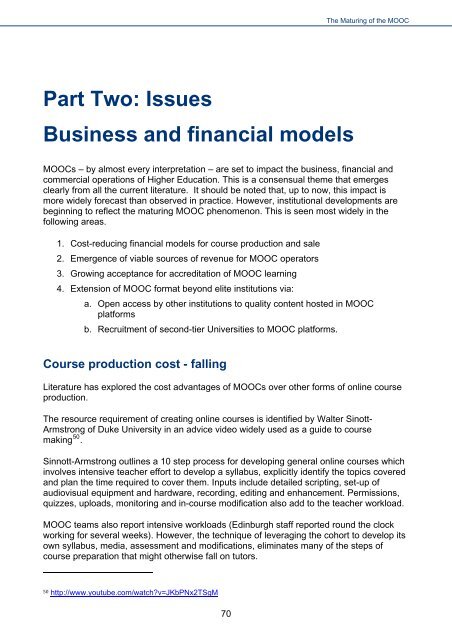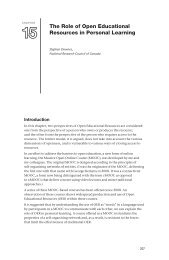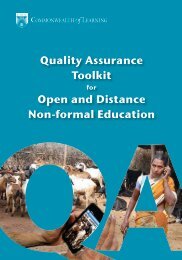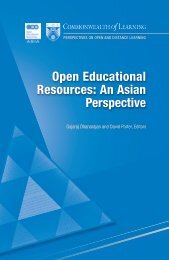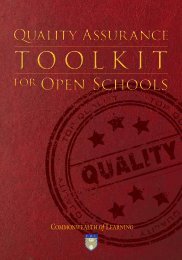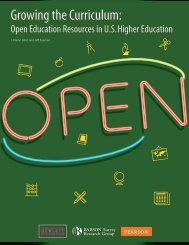The Maturing of the MOOC
The maturing of the MOOC: literature review of massive ... - Gov.uk
The maturing of the MOOC: literature review of massive ... - Gov.uk
- No tags were found...
You also want an ePaper? Increase the reach of your titles
YUMPU automatically turns print PDFs into web optimized ePapers that Google loves.
<strong>The</strong> <strong>Maturing</strong> <strong>of</strong> <strong>the</strong> <strong>MOOC</strong><br />
Part Two: Issues<br />
Business and financial models<br />
<strong>MOOC</strong>s – by almost every interpretation – are set to impact <strong>the</strong> business, financial and<br />
commercial operations <strong>of</strong> Higher Education. This is a consensual <strong>the</strong>me that emerges<br />
clearly from all <strong>the</strong> current literature. It should be noted that, up to now, this impact is<br />
more widely forecast than observed in practice. However, institutional developments are<br />
beginning to reflect <strong>the</strong> maturing <strong>MOOC</strong> phenomenon. This is seen most widely in <strong>the</strong><br />
following areas.<br />
1. Cost-reducing financial models for course production and sale<br />
2. Emergence <strong>of</strong> viable sources <strong>of</strong> revenue for <strong>MOOC</strong> operators<br />
3. Growing acceptance for accreditation <strong>of</strong> <strong>MOOC</strong> learning<br />
4. Extension <strong>of</strong> <strong>MOOC</strong> format beyond elite institutions via:<br />
a. Open access by o<strong>the</strong>r institutions to quality content hosted in <strong>MOOC</strong><br />
platforms<br />
b. Recruitment <strong>of</strong> second-tier Universities to <strong>MOOC</strong> platforms.<br />
Course production cost - falling<br />
Literature has explored <strong>the</strong> cost advantages <strong>of</strong> <strong>MOOC</strong>s over o<strong>the</strong>r forms <strong>of</strong> online course<br />
production.<br />
<strong>The</strong> resource requirement <strong>of</strong> creating online courses is identified by Walter Sinott-<br />
Armstrong <strong>of</strong> Duke University in an advice video widely used as a guide to course<br />
making 50 .<br />
Sinnott-Armstrong outlines a 10 step process for developing general online courses which<br />
involves intensive teacher effort to develop a syllabus, explicitly identify <strong>the</strong> topics covered<br />
and plan <strong>the</strong> time required to cover <strong>the</strong>m. Inputs include detailed scripting, set-up <strong>of</strong><br />
audiovisual equipment and hardware, recording, editing and enhancement. Permissions,<br />
quizzes, uploads, monitoring and in-course modification also add to <strong>the</strong> teacher workload.<br />
<strong>MOOC</strong> teams also report intensive workloads (Edinburgh staff reported round <strong>the</strong> clock<br />
working for several weeks). However, <strong>the</strong> technique <strong>of</strong> leveraging <strong>the</strong> cohort to develop its<br />
own syllabus, media, assessment and modifications, eliminates many <strong>of</strong> <strong>the</strong> steps <strong>of</strong><br />
course preparation that might o<strong>the</strong>rwise fall on tutors.<br />
50 http://www.youtube.com/watch?v=JKbPNx2TSgM<br />
70


